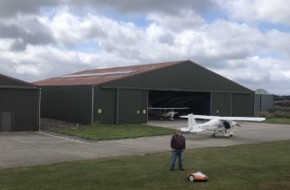Highlights
- A good example of a company which has accessed advice and support to reduce resource use.
- Implementing energy-efficiency measures and minimising carbon emissions; using LEDs for all lighting, switching to electric robotic mowers, and installing electric charging point.
- Grants awarded to install photo-voltaic panels and storage battery to further their efforts to reduce their carbon footprint.
- Helping the community through lockdown.

Strathaven Airfield is a traditional grass airfield, established in the early 1960s, which focuses on aviation for leisure and recreation and is home to west central Scotland’s only microlight flying school.
The airfield’s operations were transferred five years ago to a not-for-profit company to encourage long term sustainability – the principle being that viability is not just about money, it is also about engagement with users and playing a vital role in the identity and welfare of their communities.
The COVID-19 pandemic has highlighted this link to communities and the airfield made their open space available during lockdown to local residents for walks, also setting up a bench and table at the end of their perimeter track; they were getting up to 30 people a day using the space. The airfield has also sponsored young people with flying lessons, helped launch a university flying club, and was the original host of the charity Hangarfest launched over 10 years ago.
The airfield’s clubhouse was refurbished 16 years ago, moving to LED lighting which, at the time, was a “new technology”. Since then, they have looked for more opportunities to implement energy-efficiency measures. Now all lighting is LED, with stand-alone task illumination so they have the right lighting, at the right intensity, with financial and carbon savings.
The airfield has also invested in electric robotic mowers to cut the grass on the aircraft parking area; during lockdown electric cables were laid to extend their use on the runways. This has cut diesel consumption from previously used ride-on mowers, saving around 5.6 tonnes of CO2 per year, also reducing labour and improving the turf.
After a Zero Waste Scotland audit, Strathaven Airfield applied, and was awarded with, a Community and Renewable Energy Scheme (CARES) grant for photo-voltaic panels and associated storage battery. Additional funding for this was from the South Lanarkshire Renewable Energy Fund. This scheme should reduce the airfield’s electricity bill by around £1200 and save approx. 1.8 tonnes of carbon each year.
The airfield believes investing in new clean technology will assist their long-term sustainability and resilience. It is envisaged that even when demand is highest in summer, the output of the solar panels will match the requirements to power lighting, the robot mowers and an electric charging point for members and visitors (installed in 2016). They are also following with interest progress with the development of all-electric aircraft.
Chairman Colin Mackinnon, advises, “You might think you are too busy running your core business to bother about all this – especially with even more challenges from COVID-19. But economic and environmental efficiency is the core of any successful business. More importantly, it is the key to business sustainability. Even if you feel somewhat ambivalent, your future customers won’t. If you don’t adapt, you won’t thrive.”